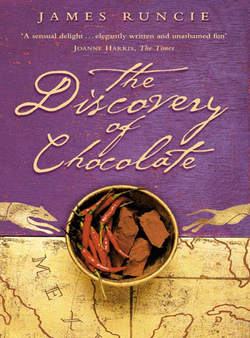Читать книгу The Discovery of Chocolate: A Novel - James Runcie, James Runcie - Страница 6
II
ОглавлениеIt was a strange homecoming. My father had died and I had little in common with the friends who had remained in the city. Their lives had scarcely changed and they did not seem interested in my travels, preferring to keep the raw experiences of war, death and adventure outside the genteel confines of the court.
On approaching Isabella’s house I was filled with an overwhelming depression. I could not see the point of anything in my life, and the love that I tried to recall, however faintly or insincerely, had vanished for ever. I was in the wrong place, at the wrong time, and with the wrong woman.
Isabella was a pale and delicate stranger, as if she had never seen the sun or walked outdoors. She held out her hand and I stooped to kiss its tiny and fragile form, thinking that this must surely be a dream.
‘My lady …’
‘You are much changed,’ Isabella ventured.
‘I have travelled many miles.’
‘And with a beard?’
Her right eyebrow raised itself in amusement and contempt.
‘It is the sailor’s custom.’
Pedro remained in the doorway, alert, watchful, and unmoved. After two years’ absence he no longer knew Isabella. She called to him, but he simply lay down, his head between his paws. Even after she had crossed the room and held him to her, Pedro remained aloof.
‘It seems you have corrupted my dog.’
‘He has seen much violence, and learned to fear strangers,’ I replied wearily. It was as if all my emotions had vanished.
‘My poor Pedro.’
‘I thought that you had given him to me.’
‘He will always be my Pedro.’
An awkward silence followed. After all the perils of separation Isabella and I had nothing to say to each other. Even today, as I write, I cannot understand how endless those two years apart had seemed at the time, and how swift and immediate was the disillusion when we were reunited.
‘I long to hear of your endeavours,’ she said at last. ‘I did believe that you might lose your life.’
‘You sound as if you might have wanted this to be so.’
‘Only in the most romantic sense.’
We spoke as strangers reciting lines from The Romance of Durandarte or as performers in a play in which we had been given the wrong parts. Perhaps she thought me uncouth, for, having seen such suffering, I was no longer the effete young gentleman she had known; and I was saddened, realising that, although I had changed, Isabella had not.
Out of boredom, I reached into my knapsack and pulled out a gold ingot.
Isabella gasped and held out her hand, which then sank under its weight.
‘Is this the treasure?’
‘It is a present, my love, but the true secret follows …’
‘And where shall I find it?’
‘If you will come to my house …’
She sat for a moment and smiled. Her canary sang in the corner, heartlessly beautiful.
‘What is that you wear upon your wrist?’ she asked accusingly. I had brushed my hair from my eyes, and the bangle Ignacia had given me had fallen forward. For the first time, I felt the need to defend myself.
‘It is nothing, my lady, a trifle.’
‘It looks like a love token.’
‘Believe me, it is no such thing.’
‘I think indeed it is.’
‘It is merely medicinal. It holds the pain at bay.’
‘I have never heard people tell of such a thing. Give it to me.’
‘I cannot.’
‘You would deny me?’
‘I must. It is fixed to my wrist. It cannot be removed.’
‘Would you cut your hand off for me?’
‘If I did such a thing I would no longer be able to defend you.’
‘Would you place it in fire?’
I thought of Ignacia making me pledge my love upon the chocolatl, and of how all my words with Isabella were of no consequence compared to that memory.
‘I would consign my whole body to the flames if I thought I could win your love …’ I stated, as boldly as I could, knowing that these rhetorical love games were ridiculous. One could be pledging love and allegiance until Doomsday if one stayed long enough at court. These were amusements of wit, without feeling or passion, and I could not believe that I, who had risked both my life and that of my companions, now lived an existence in which a man’s greatest fear might lie in an inadequate reply.
‘And, my lady, will you come in search of the treasure I have promised? Will you risk the streets of shame and danger to find me waiting for you?’
I was really quite disgusted with myself.
‘The true pleasure lies within my house,’ I continued. ‘I shall expect you to call upon me.’
